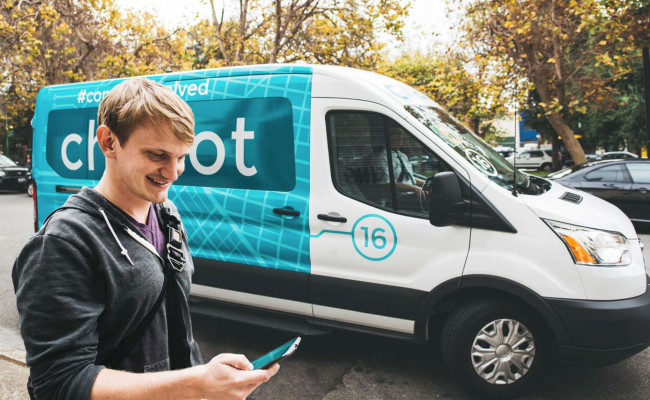Ford Smart Mobility, the company founded by Ford Motor Company to help provide alternate means of transportation, just made its first acquisition: Chariot, the San Francisco-based commuter ride-sharing startup.
For Ford, the move will make Chariot the cornerstone of its shuttle and mobility programs in cities going forward. Ford sees the startup as the path forward for its fledgling mobility company, which was officially incorporated in March, and so far has generally stuck to more limited-scope tests of its offering, mostly in partnership with academic institutions.
Chariot was founded in 2014, and has actually used Ford vehicles since day one. That’s just a coincidence, the company tells me, but it still uses only 15-seater Ford Transit vans with a tell-tale Chariot paint job. For Chariot, what being part of Ford Smart Mobility is the ability to ramp up quickly and increase the pace of expansion.
“We’re going to be super aggressive in expanding to multiple markets over the next year,” said Chariot CEO and co-founder Ali Vahabzadeh in an interview with TechCrunch. “It became very clear very early on that Chariot would be able to leverage Ford’s expertise in logistics and vehicle and operations to take Chariot and make this a global service, beyond just the Bay area.”
Existing Chariot service will continue uninterrupted, according to the company, and even the look will remain the same. Chariot will also grow out to at least five more markets in the next 18 months, according to Ford and Chariot, and the next market will be revealed sometime in the next few weeks. Vahabzadeh told me that Ford can help with expansion not only in terms of funds and logistics expertise, but also through its relationships with governments in countries and cities around the world.
Chariot’s goal was to provide a transit situation that sits near public transit in terms of cost, but that provides faster and more convenient routes. The platform crowdsources the creation of routes, aggregating desired pick-up and destination data from user interaction with its app and determining routes once interest in a particular one reaches a tipping point. It currently has 28 routes in the Bay area, with 100 vans in operation.
“We had this vision of creating this perfect commute, which was fast, reliable affordable and safe for the people of San francisco and eventually beyond,” explained Vahabzadeh.
Ford isn’t the only company to invest in shared transportation solutions; GM has its own internally-founded startup Maven, as well as a partnership with Lyft, for instance. And the Chariot model actually would fit in very nicely with Ford’s self-driving car plans, which include aiming to put a network of multi-passenger vehicles on the road to provide on-demand transit alternatives.
“There’s a long road ahead, but it’s just another reason why hooking up with Ford Smart Mobility now make sense,” said Vahabzadeh, noting that the companies will indeed look at how automation might fit into Chariot’s future.
Chariot and Ford declined to comment on the financial terms of the deal.
